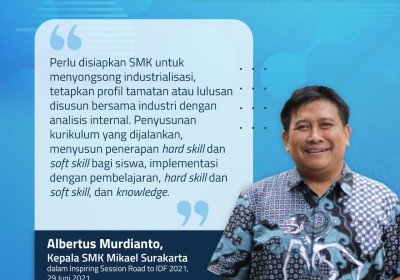Digital Transformation Relies on Human Resources
July 09, 2021
JAKARTA – Digital transformation requires connection with other technology systems to form infrastructure, networks and institutions.
Connectivity is key in the digital era by connecting the other variables around it. The ability to connect includes our ability to understand and develop new ideas through synthesis, making mutual adjustments to create higher value added.
Tertiary education institutions require increasing connectivity between teaching, research and community service, while also increasing the connectivity between scientific disciplines and with the industrial world.
"What must be remembered is also the change in the scientific culture of the campus as an intellectual platform and establishing connectivity between/across organizations and profession. We, the internal management of a university, must also help facilitate the synergy of every student's performance," Bandung Institute of Technology (ITB) chancellor Reini Wirahadikusumah said.
"Our strategy at ITB is that our graduates must be prepared for industry work. That is why we are transforming the curriculum, updating the learning management system and increasing industrial collaboration," she added.
As for vocational school (SMK) graduates, they are the largest contributor of workers compared to graduates of other education levels, with 11.45%, and will increase further due to the pandemic.
"Skills will be directly proportional to age, the older you get, the more skills you have. However, large industries generally do not require high-level hard skills that much," SMK Mikael Surakarta head Albertus Murdianto said.
For Albertus, the 2 divisions that require more attention is the production and engineering divisions: sectors which require SMK workers that have basic technical skills, as well as production skills such as design. This, according to Albert, emphasizes the role of SMK graduates in fostering industrialization.
Meanwhile, PT Schneider's success in digital transformation cannot be separated from human resources. Collaboration between campuses and schools are a tangible form of the success of digital technology that other industries can do to increase productivity.
"I believe it is Schneider's responsibility to become a role model for digital transformation. Not only on technology utilization but also on how we carried out changed management practices and put our workers at the forefront of our progress," Schneider Electric Indonesia's country director of digital transformation Fadli Hamsani explained.
"We represented Indonesia in 2019 as a global lighthouse advance industrial revolution event. This shows that the Indonesian industry, even though it is labor intensive, must not abandon digital transformation, and therefore we must prepare our human resources to do so", he added.
The same thing was addressed by ASTRA Otoparts chief operating officer Donny Novanda, who pressed that digital transformation can also be done through preparing the human capital for its progress. Astra International, the parent company, has also given assistance towards human capital regarding changes in the industry relating to hard skill, soft skill and leverage expert tracks.
"The first challenge is to address the fact that once workers get older, despite having higher skills, are reluctant to learn new things. The second is to focus on partnerships with suppliers which are able to increase our competency levels, such as technology providers like Schneider, ABB, Denso, etc, who are able to increase our competency and business transformation into the 4.0 realm," Donny explained.
Elsewhere, Wahyu Widodo Pandoe, the deputy for industrial technology and design (TIRBR) at the Agency for the Assessment and Application of Technology (BPPT), underlined the important role that small and medium industries play in developing the national industrial sector, especially if they are able to increase their expertise in technology.
"Acquiring technical knowledge through reverse engineering is also needed, which is able to transform labor-intensive industries such as the railways to become more independent and competitive. If this is achieved, then productivity will certainly increase," Wahyu said.
Indonesia’s Research Institutions Supporting the Development of the Electric Vehicle Industry
Indonesian Muslim Fashion and Cosmetics IKMs Shine at Dubai World Expo 2020
Govt Steps Up UMKM Transformation Efforts in the Midst of Pandemic Slowdown
Govt Encourages Promotion of IKM Products in Digital Era
Government Begins Developing Maritime Training Center in Makassar
Tweets by IDDevForum
